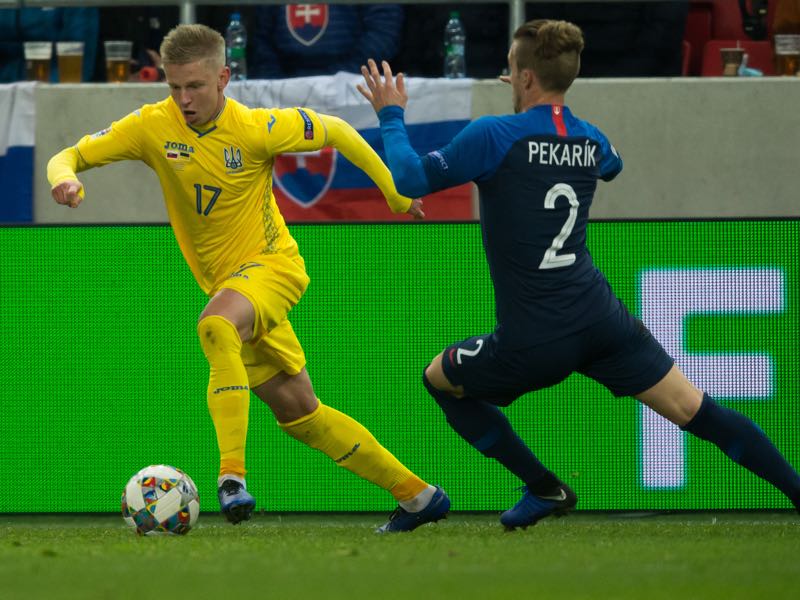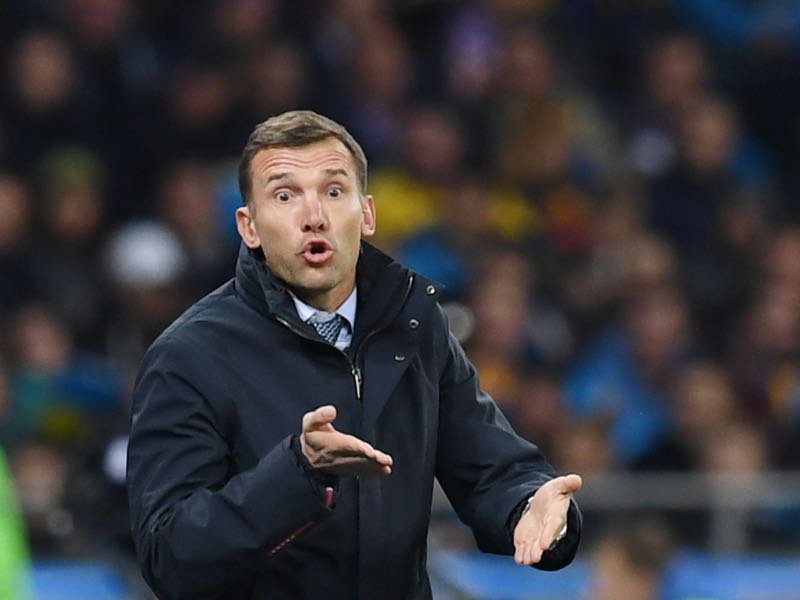Mark Temnycky –
Earlier this year, Futbolgrad examined the Ukrainian national team players who compete in some of the top European leagues and the Ukrainian Premier Liha. The athletes from both camps played an important role in Ukraine’s success during the 2018/19 UEFA Nations League campaign and their qualification for the 2020 European Championships. The skills and abilities of these players helped Ukraine win their group in the inaugural UEFA Nations League, gaining promotion to the competition’s prestigious League A, as well as winning their Euro 2020 qualification group. There is a third factor, however, that contributed to Ukraine’s successes. This is none other than Ukrainian manager Andriy Shevchenko.
Failure at the 2016 European Championships
Following Ukraine’s qualification for the 2016 European Championships, the Ukrainian Association of Football announced that Andriy Shevchenko had been hired as an assistant coach to the national team. Shevchenko would serve as a protégée to then-national team manager Mykhaylo Fomenko, and the managerial staff worked hard to prepare their squad ahead of the 2016 European Championship in France.

Watch Europa League football live. Book your custom European football travel tour by visiting Nickes.com!
Unfortunately for the Zbirna, they would be the first team eliminated from the competition. Following Ukraine’s three group stage matches, the Zbirna failed to score a single goal, and they lost all of their matches. Their performance at the competition was embarrassing and Fomenko resigned in disgrace. The UAF then decided to take a gamble. On 15 July 2016, the UAF announced that Shevchenko had been appointed as the national team manager.
Ukraine’s Qualification Cycle for the 2018 FIFA World Cup
Shevchenko’s first challenge as the manager of Ukraine was the qualification cycle for the 2018 FIFA World Cup. The Zbirna were paired with Iceland, Croatia, Turkey, Finland, and Kosovo. On paper, Ukraine seemed poised to finish in one of the top two places of the group, but this would not be the case. Poor performances against Iceland and Croatia saw Ukraine finish third in the group, thus the Ukrainians did not qualify for the World Cup, nor did they advance to the qualification playoff round.
Critics questioned Shevchenko’s abilities as they stated he did not have any managerial experience. Despite these arguments, the UAF decided to stick with their decision with Shevchenko, and the rest became history.
2018/19 UEFA Nations League and Euro 2020 Qualification
After a disappointing qualification campaign for the World Cup, things began to turn for Ukraine and Shevchenko. First, the Ukrainian manager dropped several veteran players. With the exceptions of Andriy Pyatov, Yevhen Konoplyanka, Andriy Yarmolenko, and Taras Stepanenko, the Ukrainian national team’s senior squad saw a significant turnover. Veterans Yevhen Seleznyov, Oleksandr Kucher, Artem Fedetskyi, Yevhen Khacheridi, Denys Harmash, and Yaroslav Rakitskiy were not recalled. Instead, Shevchenko opted for fresh blood, and he began to call upon players such as Oleksandr Karavayev, Serhiy Krivtsov, Mykola Matviyenko, Vitaliy Mykolenko, Eduard Sobol, Oleksandr Zinchenko, Ruslan Malinovskyi, Viktor Tsygankov, and Roman Yaremchuk.
Shevchenko also made a controversial decision in welcoming Shakhtar Donetsk’s Marlos and Júnior Moraes, two Brazilian-born footballers, to the national team. The two Shakhtar players would be naturalized, and they joined the national team (Marlos joined during the 2018 FIFA World Cup qualifiers while Moraes joined during the EURO 2020 qualifiers). In both instances, critics argued that Shevchenko should have looked for homegrown talent instead of naturalizing two Brazilian players. Nonetheless, both players have contributed well to the national team.

Ukraines midfielder Oleksandr Zinchenko and Slovakias defender Peter Pekarik vie for the ball during the UEFA Nations League football match Slovakia v Ukraine in Trnava, Slovakia on November 16, 2018. (Photo by VLADIMIR SIMICEK / AFP)
Finally, in terms of tactics, Shevchenko opted to have Ukraine a higher-tempo version of football, which included greater involvement from the team’s fullbacks while also playing a strong defensive midfield through Stepanenko, Malinovskyi, and Zinchenko. Shevchenko has also opted to play a “false nine” formation on a few occasions, where this lineup played dividends in Ukraine’s Euro 2020 qualification match against Portugal.
Shevchenko’s decisions to play younger players, naturalize the Brazilians, and change his national team’s tactics paid off. During the inaugural UEFA Nations League, Ukraine were placed in League B’s Group 1, where they were paired with the Czech Republic and Slovakia. During the mini-competition, Ukraine won three of their four matches, kept two clean sheets, and won their group. Ukraine’s promotion to the competition’s League A was deemed as an important victory, and Shevchenko celebrated the first success of his managerial tenure.
Shevchenko then built on this achievement. During the Euro 2020 qualification campaign, Ukraine were paired with Portugal, Serbia, Luxembourg, and Lithuania. To the amazement of many, Ukraine won their group. The Ukrainians won six of their eight qualification matches and drew the remaining two. The Ukrainians kept five clean sheets in eight games and only conceded four goals. Finally, the Zbirna went undefeated throughout the 2019 calendar year, where they won seven games and drew three. During this period, they scored 20 goals and only conceded six goals. Simply put, the Zbirnahave vastly transformed under Shevchenko.
2020/21 UEFA Nations League
Now, Ukraine and Shevchenko have a new challenge. Having won their group during the 2018/19 UEFA Nations League, the Zbirna were promoted to the competition’s League A. This meant that they would play against some of Europe’s heavy hitters. It would also present new opportunities for both Shevchenko and his national team.
WANT MORE FOOTBALL? LISTEN TO THE FUTBOLGRAD PODCASTS RIGHT HERE!
Ukraine were paired in Group 4 with Germany, Spain, and Switzerland. So far, the Zbirna have had mixed results. The Ukrainians defeated Switzerland in their opening match of the competition, but then they faced a heavy defeat to the Spaniards on Matchday 2. The remaining two games against Germany will be difficult, and Ukraine will still have to face Spain and Switzerland again before the competition ends. Regardless of what happens, Shevchenko has taken his national team to new heights.
Overall, the Zbirna under Shevchenko have shown that they have what it takes to compete with Europe’s elite national teams, as demonstrated by their results during the 2018/19 UEFA Nations League and the Euro 2020 qualifiers. Avoiding relegation to League B after the conclusion of the 2020/21 UEFA Nations League would be viewed as an additional success.
Mark Temnycky is an AIPS accredited journalist who covers the Ukrainian men’s national team and Ukrainian clubs competing in the UEFA Champions League and UEFA Europa League for the Futbolgrad Network. Follow him @MTemnycky




















COMMENTS